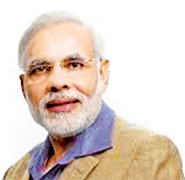|
The Indian lesson:
Reforms essential for economic growth
By Gamini Warushamana
In 2004, the United People?s Freedom Alliance (UPFA) in its policy
statement Rata Perata introduced policies opposite to that of the
‘Regaining Sri Lanka’ policies of the then UNP government.
|

Former Indian Prime Minister,
Dr. Manmohan Singh |
|

Indian Prime Minister,
Narendra
Modi |
Regaining Sri Lanka policies were labelled as extreme neo-liberal. At
that time there was a strong demand for structural reform of the economy
to accelerate growth by increasing private investment - domestic and
foreign, infrastructure development, curtailing the budget deficit,
reducing the role and size of the State sector and relaxing exchange
control regulations.
The Regaining Sri Lanka policies catered to these demands and
decisions taken to reform the economy fell foul and as a result the
government of Ranil Wickremesinghe became unpopular. His controversial
peace accord with the LTTE created huge public protest and his economic
policies aggravated it.
The 2004 , the UPFA government was a coalition with Left parties
including the JVP and, therefore, the perception was Rata Perata
economic policies of the UPFA which were nationalist and against free
market principals. When pro-market policy makers within the government,
members of the business community and economists questioned whether the
policies were practical, formulators pointed out the similarities of the
United Progressive Alliance (UPA) government's economic policies of
India.
The Indian Prime Minister Dr. Manmohan Singh too had a coalition
government with Left parties and he too had to cater to the demands of
the Left and nationalist forces in the government. These policies
advocated by Oxbridge economist Manmohan Singh were used to justify Rata
Perata policies hoping that it would work well. After two successive
terms as prime minister of India, Dr. Singh stepped down last week after
the humiliating defeat at the recent general election. Analysts said
that his defeat was mainly due to failure on the economic front.
Although he was a reformist he couldn't implement what India needed or
what he wanted, due to the coalition with Left parties.
As he said before the election, “I have done the best I could under
the circumstances. Historians will judge how successful it was.”
After the defeat of the UPA, analysts are assessing what really went
wrong and most believe that Dr. Singh failed to bring in the reforms
that India needed. As he admitted, he did everything that had to be done
under the given circumstances.
A recent article in The Economist magazine on the Indian economy too
point this out and said that reformist politicians such as the outgoing
prime minister, Manmohan Singh - lacked the clout to implement their
policies.
As renowned Indian economist of Columbia University, Prof Jagdish
Bhagwati told Forbes magazine last week, the UPA government failed to
bring essential reforms into the Indian economy.
“The UPA always put restrictions. They worried about which sectors
should be opened. It was a half-hearted, weak-kneed opening” he said.
Economic growth is the main concern and during the UPA government's
two terms, growth did not pick up.
From 2005 to 2013 the GDP growth rates were 8.4, 9.2, 9.0, 7.4, 7.4,
10.4, 7.2, 6.6, 4.7 and 5 percent and there was a slow down in growth.
As Prof. Bhagawathi explained in his interview , “Policies that promote
growth represent a double-barrelled attack on poverty”.
Strong growth brings more tax revenue to the State and with more
revenue, government can undertake social spending to give additional
benefits to the poor, such as health care and education, he argued.
Prof. Bhagawathi will be an external adviser to Prime Minister
Narendra Modi and is hopeful that the new government would attempt to
radically reform the Indian economy as Narendra Modi did in Gujarat as
chief minister.
However, some analysts argue that reforming the Indian economy is not
a simple issue that solely depends on the wishes of the ruling party,
Prime Minister or Finance Minister.
Strong nationalistic perceptions in the Indian people always resist
the idea of reform. One reason is the perception among Indians inherited
from being in the Soviet block during the cold war era and as a result
always resist what the West advocates on the political and economic
fronts.
On the other hand, reforms that remain to be introduced in India are
challenging and they include mainly the factor markets such as labour
and land, removing barriers to FDI and removing trade restrictions.
Therefore, the task before the new government is not easy. However,
Modi is recognised as a Hindu nationalist rather than a reformist.
India's economic growth may have a significant impact on regional
economies and geopolitics in the world. India needs to catch up on the
economic growth of East Asia and China and analysts point out that
without structural reforms India cannot achieve it.
Thirty years ago, the per capita GDP of China and India were the same
at around US $300. Today, China's per capita GDP has increased to US
$6,091 while in India it is only US$ 1,503, less than a quarter of
China's GDP and this clearly points out the backwardness of the Indian
economy.
India's rise as a economic giant will definitely benefit regional
economies.
What happened and is happening in India are lessons for Sri Lanka and
other South Asian countries that are in a similar dilemma regarding
structural reform. |

